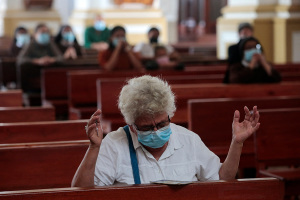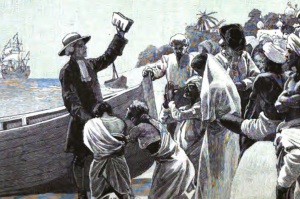The Urgency of National Repentance

A half-century later, in 1863, national repentance was again on the minds of many of the nation's leaders as North and South waged war against one another. President Lincoln concurred with the Senate in designating April 24, 1863, as a day of "national prayer and humiliation."
"Righteousness exalts a nation, but sin is a disgrace to any people," says Proverbs 14:34.
"Disgrace" refers to that which actually brings down a nation. National repentance is crucial for ridding a country and its people from the evils that cause fragmentation and dissolution. As with Lincoln and other leaders in American history, it is vital to identify and repent over specific sins against God's holiness.
National repentance is also strategically important because of the way the powers of darkness operate.
Paul writes that "we wrestle not against flesh and blood, but against principalities, against powers, against the rulers of the darkness of this world, against spiritual wickedness in high places …" (Ephesians 6:12)
The demonic operates on the principle of "place," or "ground." (Ephesians 4:26-27)
It is our own sin that provides the "ground" on which the demonic can build fortresses within us individually and nationally. Repentance removes the ground, and deprives Satan of his opportunity to control and destroy us.
The United States — any nation — repents the same way ancient Israel carried out national repentance: through the faithful remnant.
The principle is given in 2 Chronicles 7:14-16, where, as the Temple built by Solomon is dedicated, God promises:
(If) My people who are called by My name humble themselves and pray and seek My face and turn from their wicked ways, then I will hear from heaven, will forgive their sin and will heal their land. Now My eyes will be open and My ears attentive to the prayer offered in this place. For now I have chosen and consecrated this house that My name may be there forever, and My eyes and My heart will be there perpetually.
Centuries later Simon Peter tells Jesus, "You are the Christ, the Son of the living God." On the basis of that confession Jesus gives Simon a new name — Petros, a "piece of the Rock." And Jesus gives Simon Peter and all like him something else: "the keys of the Kingdom of Heaven."
Simon Peter's acknowledgement of Jesus as the "Christ" is the fundamental confession of the Church. The "keys" symbolize the authority of the Kingdom of God. They are given to the confessional community, the real Church that joins in Peter's declaration of Jesus' Messianic identity.
That authority was not given to the White House, the Congress, the Parliament, the Kremlin, or any other earthly power. The authentic Church is the agency of God's authority in the world. This is not mere earthly power that depends on the strength of human flesh and muscle. Rather, it is authority against the spiritual forces out to destroy the world.
When the Church repents on behalf of its nation, God releases forgiveness and healing on the land. When that happens the waters of revival sweep across the nation, bringing life where there have been dry deserts, and the harvest where there have been barren fields.
The best thing for America — and all the nations — is for the remnant within the midst of society to begin the New Year on its knees, repenting for national sins, and seeking God for revival.
Correction: An earlier version of this op-ed only listed Wallace Henley as the author. It was co-authored by Henley and former majority leader of the U.S. House Tom DeLay.




























